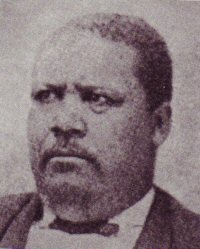William Grose (pioneer) facts for kids
Quick facts for kids
William Grose
|
|
|---|---|
 |
|
| Born | 1835 |
| Died | July 27, 1898 (aged 63) Seattle, Washington
|
| Resting place | Lake View Cemetery, Seattle, Washington |
| Other names | William Gross |
| Occupation | ship steward, hotel owner, restaurant owner, rancher, businessman, miner |
| Known for | Being the second African-American resident of Seattle and the wealthiest, nineteenth-century member of Seattle's black community |
| Spouse(s) | Sarah Grose |
| Children | 3 |
William Grose (born in 1835, died July 27, 1898) was an important African-American pioneer in Seattle. He was the second Black resident of the city. He also became the wealthiest Black person in Seattle during the 1800s. His ranch, located outside the city, later became a key area for Seattle's Black middle class.
Contents
William Grose's Early Life and Arrival in Seattle
William Grose was born in Washington, D.C.. His father owned a restaurant and was a free Black man. At age 15, William joined the U.S. Navy.
After leaving the Navy, he lived in California and British Columbia. In 1861, he arrived in Seattle as a ship's steward. Soon after, his wife, Sarah, and their two children joined him. Sarah Grose and their daughter Rebecca were the first Black women to live in Seattle. Governor Isaac Stevens encouraged Grose to settle in Washington Territory. This happened after Grose found and returned the governor's lost watch.
Building a Business in Pioneer Seattle
William Grose arrived in Seattle before 1870. In 1876, he opened a restaurant and hotel called "Our House" on Yesler Way. This place was very popular with Seattle's mostly white residents. Later, he added a barbershop to his business.
At that time, jobs like restaurant owner or barber were some of the few options for Black people in pioneer Seattle. While Seattle did not have strict racist laws like nearby states such as Oregon and Idaho, opportunities for Black people were often limited to basic jobs. Important industries like logging, mining, and shipping were not open to Black workers.
Seattle's first Black resident, Manuel Lopes, also worked as a cook and barber. Grose's hotel offered a place to stay for many of Seattle's early Black residents. These were often workers who moved around a lot in the late 1800s.
Grose's Property and Community Impact
William Grose became very successful. In 1882, he bought twelve acres of land from Henry Yesler along East Madison Street. After the Great Seattle Fire in 1889, Grose's hotel burned down. He then moved his home to 2813 E Howell. This is where he lived until he died.
After his death, his wife, Sarah, lived at 1729 24th Avenue. The house next door, at 1733 24th Avenue, is sometimes thought to be his, but it was built in 1901, after he passed away.
Grose gradually sold parts of his land to other successful African-Americans in Seattle. This area became the northern part of what is now Seattle's Central District. The southern part of the Central District, around Jackson Street, was poorer and had more temporary residents.
By the 1890s, Grose was the wealthiest Black resident in Seattle. In 1891, Grose, along with Dr. Samuel Burdett and Conrad Rideout, started the Cornerstone Grand Lodge of the York Masons. This was Seattle's first Black Masonic chapter. Women relatives of the Masons formed the Queen of Sheba Court. This lodge held yearly parades down Madison Street from its start until the 1940s.
Grose was also a trustee for Seattle's first African-American church. This was the Jones Street African Methodist Episcopal Church, now called First AME Church. It was founded in 1891 by Reverend L. S. Blakeney, Seaborn J. Collins, Alfred P. Freeman, and Grose's son, George H. Grose.
William Grose died on July 27, 1898. He is buried in Lake View Cemetery (Seattle).
William Grose's Lasting Legacy
Today, there is a park named after William Grose in Madison Valley.
On September 16, 2022, the William Grose Center for Cultural Innovation opened. It is located at 23rd and Yesler. The Africatown Community Land Trust (ACLT) turned an old Fire Station 6 into this technology center. It aims to help Seattle's next generation of tech developers, creative professionals, and future business owners. This center continues William Grose's legacy of community building and opportunity.
 | Anna J. Cooper |
 | Mary McLeod Bethune |
 | Lillie Mae Bradford |

